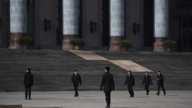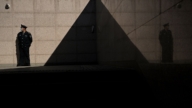【新唐人2012年11月10日訊】對於十八大,現在全球關注的焦點是這次開幕式,看到一群退休的中共領導人紛紛出籠,當中最受矚目的莫過於中共前總書記江澤民。有評論指出,胡錦濤把江澤民拉進十八大,是給習近平做樣版,藉此傳遞未來他也要「垂簾聽政」的訊息。外界認為,中共十八大開幕發出的信號,是中國新一屆領導人的活動空間有限,黨內領導人可能根本無心開展決定中國未來走向的政治改革。
十八大開幕式由人大委員長吳邦國主持,除了中共十七屆政治局委員和常委之外,江澤民、朱鎔基、李鵬、李瑞環、宋平等元老,也都在主席臺的前排就座。
時政評論家孟淵沛:「像回到毛澤東、鄧小平時代中顧委員那些老人,這就是中國政治的倒退。老人政治是封建專制的一個特色,老人政治通過權力非正常的一個傳遞,一代指定一代。就是沒有選舉的,到最後都形成了一個老人政治,這是不民主的一個社會政治生活常見的一個現象。」
一群退休的中共領導人幾乎傾巢而出,而當中最受矚目的莫過於中共前總書記江澤民,雖然高齡86歲,走路還需要人攙扶,但他還是不改本色,如五年前的十七大上,斜眼偷瞄倒茶水的女服務員,今年也不例外。
對於中共的權力交接,時事評論員汪北稷表示,在民主國家,一旦新的國家領導人誕生以後,原來的前任領導人,在預定的時間內完成工作交接後,就要離開他的工作崗位,然後再以前領導人的身份,過一個普通百姓的生活。反觀中國,這些卸任的領導人佔用社會資源,浪費民脂民膏,還要干涉現任領導人的管理工作。汪北稷說,十八大的會議一眼望去,都成了「三代同堂」的畫面了。
時事評論員汪北稷:「這些上了年紀的人卻不知道自愛,還在這個舞臺上面,這種表現讓我們在民主社會生活過的人,感到很刺眼,很難過,為中國人民百姓感到很難過,這麼大年紀的人還擠在這個主席臺上去搶這個權力。」
開幕式上午,總書記胡錦濤提出政治報告,長達一個半小時的內容,聽得不少領導昏昏慾睡。英國廣播電視(BBC)說,胡錦濤是借報告來鞏固他在黨內承傳的地位。
時政評論家孟淵沛也指出,中共大老集體亮相,實際上就是專制者害怕被清算的一個表現。因為這套選舉的機制不是民主的,是不規則的,新上來的對老的不服,但是老的又不退,要來壓住新上任的。
孟淵沛:「無論是胡錦濤、江澤民還是周永康他們都想退而不休,因為他們一旦全退、全休的話,他們考慮他們的不僅是地位權力的問題,主要是人身安全,因為他們在位的時候幹下的滔天的罪行,他們一定要被清算,所以他們就一定要保留在那個位置上,想方設法留下來,他們對繼任者都是不放心的。」
孟淵沛還表示,這次十八大的權力介入,場面很震撼。這個專制政治以後可能會轉為軍閥政治,因為沒有遊戲規則。
孟淵沛:「現在高層都血風腥雨的,你不介入你就得死啊,所以江澤民一定要強力的介入。他們對胡錦濤這面的一些人感到不放心,比如說溫家寶,壓住溫家寶的氣勢。還有汪洋,還有令計劃,他們覺得不穩的這些人一旦上臺,一旦掌握所有權利,就會改革,改革首先就會損害他們的利益,甚至性命。」
外界評論,新一屆的領導人習近平頭頂上有太多「太上皇」了,活動空間有限,未來他既要保黨,又要保現有這些既得利益者,對於民眾期待的政治改革之路,答案肯定是令人不滿意。
採訪/陳漢 編輯/黃億美 後製/郭敬
CCP Regime’s Political Reform Hardly Expected
The world’s attention is focused on the opening ceremony
of the18th Party Congress.
A group of retired Chinese Communist Party (CCP) leaders
appeared at the ceremony.
The spotlight was on Jiang Zemin, former CCP
General Secretary.
Commentators say that Hu Jintao used Jiang
to hint at his “reign behind a curtain” to Xi Jinping.
Analysts think that the CCP Congress shows that
its new leader team is subject to obvious political restraint.
Therefore, China is not expected to see real political reforms.
Wu Bangguo chaired the opening ceremony of
the 18th Party Congress.
Members of the 17th Party Congress Politburo and
of its Standing Committee attended the conference.
The retired CCP veterans present included Jiang Zemin,
Zhu Rongji, Li Peng, Li Ruihuan and Song Ping.
Critic Meng Yuanpei: “It’s like going back to the era under
Deng Xiaoping’s Central Advisory Commission.
This is a political regression in China to
form a “politics of the elderly”.
In this way, the Party’s veterans have passed down power
and nominated the new generation of leadership.
All CCP leaders were not elected. The “politics of the elderly”
is unusual compared to democratic politics.”
Nearly all retired CCP leaders showed up
at the 18th Congress.
86-year-old Jiang Zemin moved into the spotlight,
Hu walked alongside while another supported his arm.
Just as he did at the 17th Party Congress five years ago,
Jiang peeked askew at the waitress pouring tea.
Critic Wang Beiji comments on the CCP power transition.
He said that in a democratic state, once the new leader is
elected, the ex-leader will leave the position after job handover.
From then on, his identity is just a former leader.
This is in a sharp contrast to CCP retired leaders,
who consumed public wealth through their privileges.
Further, they intervene in the incumbent CCP leaders’ work.
Wang Beiji describes the 18th congress as just like
a family party at which all three generations were present.
Wang Beiji: “All these elderly don’t know about self respect,
still lingering on the political stage.
This is really unnatural behavior, in the eyes of
Chinese living in democratic countries.
We just feel sad for our Chinese fellow citizens, as these
elderly, at such an old age, still jostle to grab power.”
On its opening ceremony, CCP General Secretary
Hu Jintao delivered a 1.5-hour report.
The BBC reviewed that Hu had used the report
to cement his position inside the CCP.
Critic Meng Yuanpei says, CCP veterans’ group show-up
actually shows they fear ending up with punishment.
This is because that CCP leader appointment never goes
through democratic election.
The Party’s new leadership team unwillingly
obeys the predecessor.
Yet, the predecessor refused to truly step down, and
wanted to dominate the successor, Meng Yuanpei remarks.
Meng Yuanpei: “Those CCP leaders, including Hu Jintao,
Jiang Zemin and Zhou Yongkang, all wanted to retire but remain in office.
Because once they completely step down, their main concerns
are not only the power, but also their personal safety.
They know that one day, they’ll be brought to justice for
all crimes they have committed in office.
So they just tried so hard to stay in office,
for they don’t trust their successors."
Meng Yuanpei adds that the 18th Party Congress
was heavily power dominated.
This authoritarian ruling may be turned into warlord politics,
as it never sets up game rules.
Meng Yuanpei: “Now the CCP top level is busy with
bloody infighting. Who gives up, that’s who will be sacrificed.
That’s why Jiang Zemin and his men
desperately intervened.
They don’t trust the faction under Hu Jintao.
For example, they attempted to suppress Wen Jiabao’s vigor,
to hold down Wang Yang and Ling Jihua.
They feared that these people, once in power,
will launch reform which will directly threaten their power and even their lives."
Political observers remarked that CCP new leader Xi Jinping
is now subject to too many “backstage rulers".
In the future, it is the restrained Xi, who will have to
secure the CCP, as well as vested interest groups.
Therefore, commentaries do not expect that Xi will
satisfy the populace on their much-anticipated political reform.


























